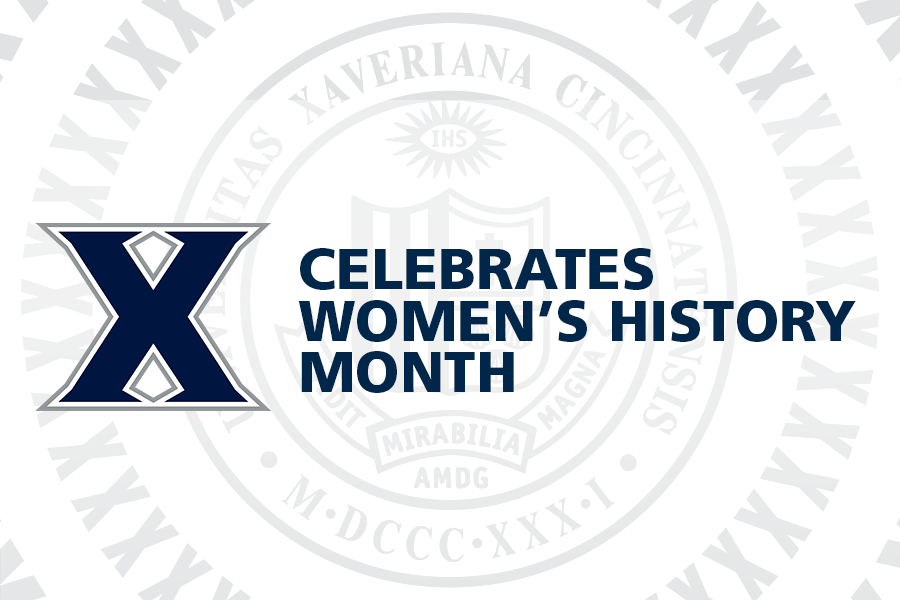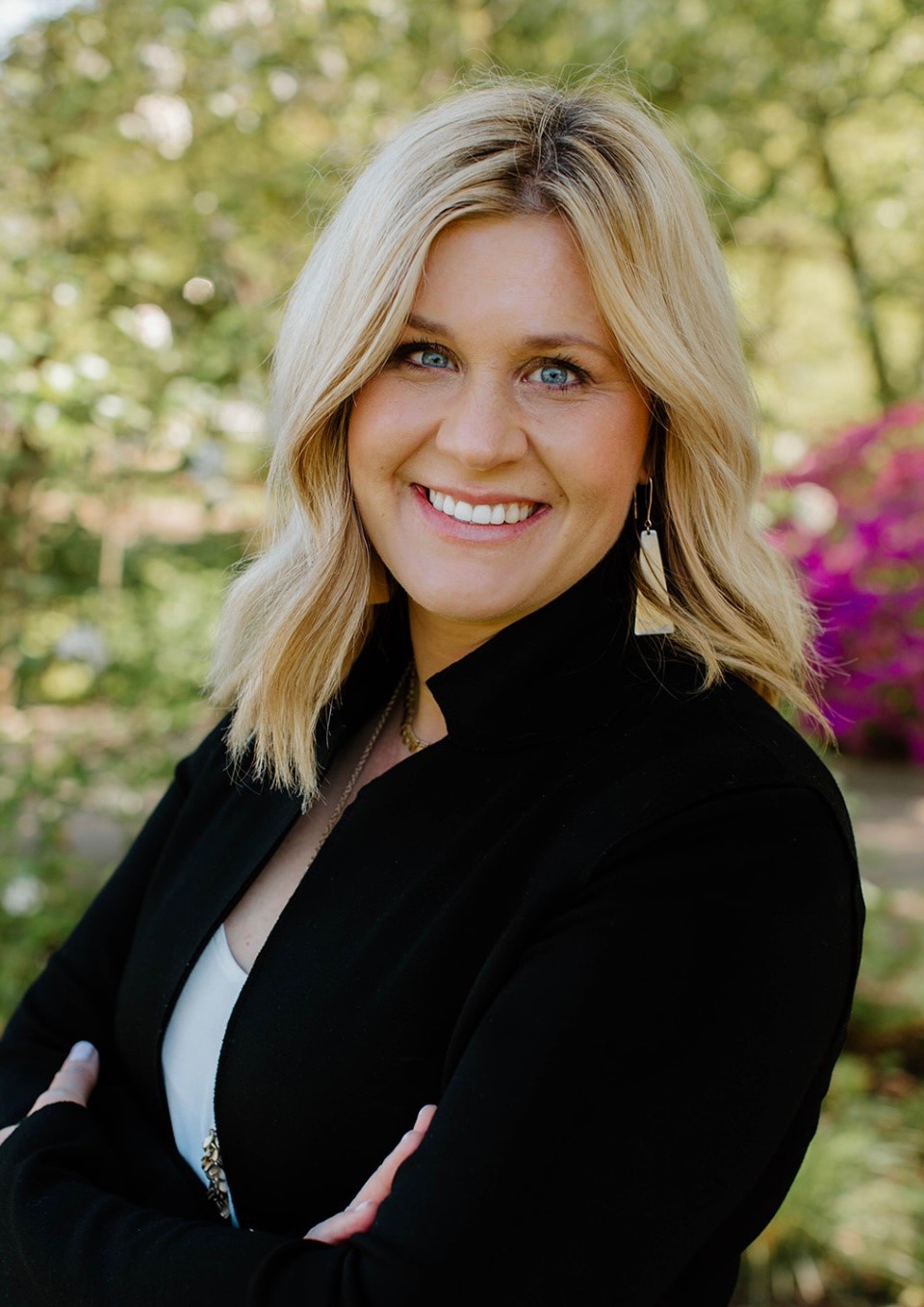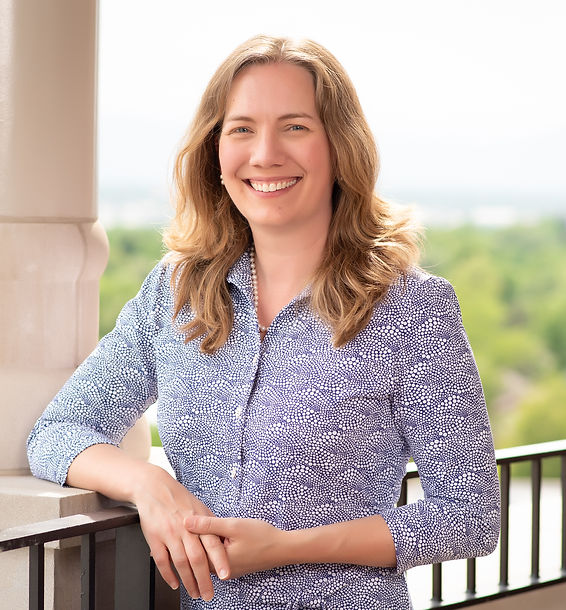
WOMEN FOR OTHERS: CELEBRATING WOMEN IN THE XAVIER UNIVERSITY COMMUNITY
Mar 18, 2022
March marks Women's History Month, designated to recognize and honor the vital role of women in American history.
Xavier University proudly celebrates the many women who serve as important pillars in the Xavier community.
Throughout the month, Xavier will be featuring several respected leaders and members of the Xavier community — getting insight into their career paths, as they share stories about the women who've inspired them and give practical advice for young women today.
Stay tuned weekly for updates in Today at Xavier and on Xavier.edu.
Name: Rachel Chrastil, PhD
Title: Provost & Chief Academic Officer
First Year at Xavier: 2005
How did you come to arrive in your position?
“I started at Xavier in 2005 as an assistant professor in the History Department, so this is my 17th year at Xavier. I was drawn here because I wanted to be a teacher. I wanted to teach history and I wanted to be at a place where teaching mattered, where it was valued, and where I could impact students."
What advice do you have for women at Xavier, or any other university right now?
“This would be advice for anyone, but I would say take a little bit more risk than you think you can take. I also think it's important to have conversations with mentors who can tell you: 'you can do this, I see this in you.' And I think it's important for those in mentoring positions to have the same conversations with those who are coming ahead."
Who is a woman you’ve always looked up to and why?
“Well, it would be my mom because she has given me so many great pieces of advice. When we were having hard times in our family, she would always say, 'the wolf is not at the door, we're going to be fine.' And she just always set that kind of expectation. There are also so many strong women at Xavier. It's like I'm running through a Rolodex of great people and some of them are senior and some are junior to me. I've learned from all of them."

Name: Jamie Baxter
Title: Director of Counseling Services
First Year at Xavier: 2017
What brought you to Xavier and how did you arrive at your current position?
"I got my master's here and it was sort of a second career for me. My undergraduate degree is in music and I stayed home with my kids for a few years and had a private music studio. I came to Xavier to get my master's and actually did my internship at the counseling center. So I was one of those master's students and I absolutely fell in love with the Xavier way.
The Xavier whole-person mission resonated so well with me, especially when talking about someone's mental health. And so I really wanted to stay on at Xavier. I thought if I could just get a job here, that would be incredible, and there just wasn't anything available at that time. And so I worked in community mental health, which I also loved. It was a great experience working with a very diverse population. Then there was an opening here and Xavier called me and said, 'we have a three-month temporary position. Would you be interested?'
And I remember thinking hard about leaving my full-time job to sort of take this risk, but it felt like it was a foot in the door for a job that I wanted so badly in a place I wanted to be. So I did it. I resigned from my job and took this three-month temporary position, which led to a staff position."
Who is a woman who made a profound impact on your life?
"My mom is one of them and my mom is a ranch woman. I was raised in South Dakota and she is a very tough woman, tough skin with a soft heart. And she really, I think, modeled to me what leadership looks like in a woman and in a very confident but kind of quiet way with her way of doing it. And she always said to me, you know, she had a couple of go-to things which are kind of cliche, and one was, 'you sprout where you're planted; wherever you are, make the most of it and do your very best.
She also said, 'don't wave flags about what you're doing or who you are. People will notice and it will work out and you'll end up where you're supposed to be.' She was just this example of grit and grace to me."
What advice do you have for young women here at Xavier or women college students in general?
"Young women who walk into my office, I don't necessarily meet them at their finest hour. A lot of times I meet them in their time of struggle and questioning. There are so many things I share with them. One is just to hold your head up high and do the best with what you have. Make the most out of what you have and where you are.
Another thing that I often say to clients, in general, is that you can't drive a parked car. Sometimes we get so stuck in thinking, 'What do I do next? Sometimes you just have to put your head up, put your shoulders back, and just start moving. Start going somewhere and then you'll gain the confidence and find that sort of that right road and right path. You just have to keep moving, keep showing up."

Name: Molly Dugan, EdD
Title: Director of Student Integrity, Staff Advisory Council Chair
First Year at Xavier: 2011
How did you arrive at your current position?
"I grew up, born and raised, on the West Coast – went to undergrad at the University of San Francisco and grad school at Seattle University. I then spent a summer working at a women's college, and so I had an opportunity after graduate school to move to Spartanburg, South Carolina, to work at a small, private women's college, which was great.
After three years, I was ready to do something else, and somebody had sent me the link to a different position here at Xavier. I started in the Office of Student Involvement doing leadership and orientation programs. It was a late summer posting so it was not in what we think of as the typical hiring period.
So I went back and forth; “Do I apply? Do I not?” I decided to go for it because it was back at a Jesuit institution. I could do the things that I love, which was the leadership and especially the orientation programming. I was in student involvement for eight years and ran Manresa nine times. During that time, I got my doctorate here. I did the Leadership Studies Doctoral Program. That program felt like the right next step.
Then I was thinking, ‘OK, I've got that. What is the next thing?’ I thought that would mean I needed to leave Xavier and was interviewing with other places, looking at other opportunities. Nothing really felt like the right thing. I had been here eight years at the time and really liked Cincinnati. I had come to love living here, and so was not totally sold on leaving. Then this position (for Director of Student Integrity) posted and I took a leap of faith and applied.
It gave me the opportunity to stay here at an institution that I love, doing something new and different while being challenged."
What drew you to Xavier?
"I think when I was initially looking, it was truly that it was back in Jesuit education. I am not Catholic; I was born and raised Presbyterian, and in my hometown in Oregon, there was like one Catholic school and it was grade school only. So it wasn't inherent to me to be in Catholic education.
Then, by nature of the way things worked out, I landed at the University of San Francisco for undergrad, based on an academic program that they had for teaching, which is what I was going to do. I decided that wasn't going to work, but when I was there, the experience was transformative, and I know that was because it was a Jesuit institution.
So when I was deciding what to do for graduate school, somebody that had been professional staff at USF had left to go to Seattle University to work there, and I didn't really know what I was going to do. I knew I wanted to get into higher education and student affairs, but I thought maybe I’d take a year off or something.
That person approached me and said ‘We have a program here (at Seattle University). You could still apply and get an assistantship.’ I did, and that was that was that, because I didn’t apply anywhere else. It really appealed to me to stay in the Jesuit network, which would later bring me to Xavier.
You could say this for a lot of places, 'mission- and values-driven,’ but I firmly believe that we practice what we preach. We don't just talk about Cura Personalis and Magis and walking with those who are marginalized. I think we really live that, or we try to, in the way that we care for our students, in the way that we program for our students. So that’s what drew me here, keeps me here.
What women have had an especially profound impact on you?
The people that came to mind were Ruth Bader Ginsburg, and my mom, Judy, and it's kind of interconnected. My mom was one of the first female lawyers in our county. She and her friend Lynn, they were the first two female lawyers. They started practicing at the same time.
Within the late 70s, as RBG was kind of rising in the ranks of knowledge and as she had fought in the courts for gender equality and that sort of thing, that was an important part of my mom's experience as a lawyer, and so I think that (reverence for Ginsberg) kind of rubbed off on me.
I was in elementary school when she became a Supreme Court Justice. The work she did on the courts to fight for equality has been so impactful.
What about women on campus who inspired or impacted you in a big way?
"There’s a long list … but the first person who came to my mind was Susan Abel, the Associate Vice President for University Relations. She was the chair of the Staff Advisory Committee right before me, and so I was the chair-elect under her and we got to know each other really well while working hand in hand. She was the chair when COVID hit, and she's just a very quiet and unassuming leader, but really thoughtful, really smart and wise about decisions or approaches, and I strive to be like her and in both my role as SAC Chair, but also just how she does her work.
Another one is Abby King-Kaiser in the Center for Faith and Justice. She started a year after me. The way she approaches life, I just wish I could do that. I don't have a better explanation.
Another is Janice Walker. Janice, I think, pushed our University in many ways through the often slow, sometimes painful process of pushing us to be a more diverse and equitable place, particularly over the last four or five years. I just appreciated her in her role as a VP, how she really did her best to understand all the different perspectives. She's someone I could trust.
Last but not least is Mary Ballou, Executive Assistant in the Office of the President. She has been a constant support and role model for me since I was hired."
What has your experience been like as a woman at Xavier?
There have certainly been times, particularly in my earlier days at Xavier, where I’d be in meetings with a male co-worker and people would automatically defer to, ‘he must be the boss, right?’ And you can’t help but wonder, ‘Is that because he’s a man?’
I think that has shifted in the time that I've been here. I think the experience that perhaps I had in the first few years, I don't think would happen in the same way today. I don't think there are the same automatic assumptions that the man is always the leader, and we've even seen that shift at the top levels. Literally at the very top (with the appointment of President Colleen Hanycz), but even in the cabinet and who's making decisions.
While there have been a couple of negative experiences as a woman, I absolutely think I’ve seen progress. I'm optimistic for where we will go. I think (Vice President for Institutional Diversity and Inclusion) Ivy Banks is a great champion, and with Dr. Hanycz being our first lay president, it's definite progress.
What advice do you have for women at Xavier or women college students in general?
"I've got a couple things. One is to take risks and go for it. Don't not go to that club meeting or that leadership event or that retreat. Do all those things, because you never know what thing will become your thing. Put your phone down, get out from behind the screen and go do things; put yourself out there.
The other is, shout out to all the women like me who were told they were bossy and loud as a child, and my advice for them is to not let that be your narrative. Own who you are. Use those traits to step into leadership positions. I firmly believe that if instead of telling young girls that they're being loud or bossy or whatever, we cultivated their leadership skills, we'd be in a different place."
